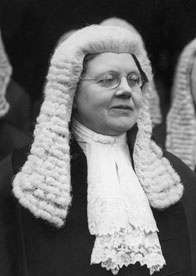Helena Normanton

Helena Florence Normanton, QC (14 December 1882 – 14 October 1957) was the first woman to practise as a barrister in England. In November 1922, she was the second woman to be called to the Bar of England and Wales, following the example set by Ivy Williams in May 1922.
Early life
Normanton was born in London, the daughter of a piano maker. After her father was found dead in a railway tunnel in 1886, her mother began letting rooms in the family home, before moving to Brighton run a grocery and later a boarding house.[1]
Normanton won a scholarship to York Place Science School in Brighton (later Varndean School for Girls). She trained as a teacher at Edge Hill Teacher Training College in Liverpool between 1903 and 1905.[2] There is a Halls of Residence called Normanton at the university in her honour.[3]
She read modern history at the University of London, graduating with first class honours, obtained a Scottish Secondary Teachers' Diploma, and held a diploma in French language, literature and history from Dijon University.[4] She lectured in history at Glasgow University and London University, and began to speak and write about feminist issues. She spoke at meetings of the Women's Freedom League and supported the Indian National Congress.
Legal career
Normanton held ambitions to become a barrister from a young age. An application to become a student at Middle Temple in 1918 was refused, and she lodged a petition with the House of Lords. She reapplied in 1919, within hours of the Sex Disqualification (Removal) Act 1919 coming into force, and was admitted to Middle Temple.[5] She married Gavin Bowman Watson Clark in 1921,[4] but preserved her maiden name for professional reasons.[5] In 1924, she became the first married British woman to be issued a passport in her maiden name.
She was the second woman to be called to the bar, on 17 November 1922, shortly after Ivy Williams. She was the first woman to obtain a divorce for her client, the first woman to lead the prosecution in a murder trial, and the first woman to conduct a trial in America and to represent cases at the High Court and the Old Bailey. In 1949, along with Rose Heilbron, she was one of the first two women King's Counsel at the English Bar.
Feminism
Normanton was a campaigner for women's rights and women's suffrage, becoming the first married woman in Britain to have a passport in her maiden name, believing that men and women should keep their money and property separately.[6] She was also a pacifist, later being a supporter of CND.[2]
She campaigned for divorce reform, and was president of the Married Women's Association until 1952, when the other officials resigned over her memorandum of evidence to the Royal Commission on Divorce, which they regarded as 'anti-man'. Normanton formed a breakaway body called the Council of Married Women.[5]
She founded the Magna Carta Society. She was a pacifist throughout her life, and demonstrated against the nuclear bomb after the Second World War.
She died in London and her cremated remains were buried near those of her husband in Ovingdean, Sussex.
Works
- Sex differentiation in salary, 1915
- India in England, 1915
- Oliver Quendon's First Case, 1927 (a romantic detective novel published under the pseudonym Cowdray Browne)
- The trial of Norman Thorne : the Crowborough chicken farm murder, 1929
- Trial of Alfred Arthur Rouse, 1931
- Everyday law for women, 1932
- The Trial of Mrs. Duncan, 1945
Archives
The archives of Helena Normanton are held at The Women's Library at the Library of the London School of Economics, ref 7HLN
References
- ↑ Joanne Workman, ‘Normanton, Helena Florence (1882–1957)’, Oxford Dictionary of National Biography, Oxford University Press, 2004; online edn, Sept 2011 accessed 20 July 2012
- 1 2 Helena Normanton biography, Spartacus Educational, accessed 10 January 2011
- ↑ http://www.edgehill.ac.uk/undergraduate/accommodation/livingoncampus
- 1 2 Who's Who 1938, p 2513
- 1 2 3 'Obituary: Mrs H. F. Normanton, Q.C.', The Manchester Guardian, 16 October 1957
- ↑ Edge Hill magazine, Edge Hill University, accessed 10 January 2011
|